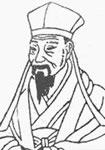残醉瞢腾不易禁
一生心事杏花诗。
小桥春寂寞,风雨鬓成丝。
天上鸾胶寻不得,直教吹散胭脂。
月明千里少姨祠。
山中开较晚,应有北阴枝。
小桥南北梦幽寻。
残醉瞢腾不易禁。
一树杏花春寂寞,恶风吹折五更心。
此予二十年前嵩山中诗也。
残醉瞢腾不易禁。金朝。元好问。醉眼纷纷桃李过,雄蜂雌蝶同时。一生心事杏花诗。小桥春寂寞,风雨鬓成丝。天上鸾胶寻不得,直教吹散胭脂。月明千里少姨祠。山中开较晚,应有北阴枝。小桥南北梦幽寻。残醉瞢腾不易禁。一树杏花春寂寞,恶风吹折五更心。此予二十年前嵩山中诗也。
桃李:唐代狄仁杰曾向朝廷荐举姚元崇等几十人,都成为名臣。有人对狄说:天下的桃李都在你门下了。语见《资治通鉴·唐纪则天皇后久视元年》。后以“桃李”喻指所教育的学生:~满天下。
雄蜂:由未受精的卵发育而成的蜜蜂。
一生:(名)指一个人从生到死的全部时间:~一世|~操劳|~的心血。
心事:(名)心中所思念或所期望的事。
杏花小桥:1.人物名字同“小乔”,三国吴周瑜之妻。2.小型桥梁。
风雨:(名)①风和雨:~无阻|~大作。②比喻艰难困苦:不经历~,怎么见彩虹?
鸾胶不得:1.不可能;不允许。2.得不到;找不到。
吹散:吹之使散开。犹拆散。谓消弭事端。
胭脂:由胭脂虫雌虫的干燥身体组成的一种红色染料;一种化妆用的红色颜料,也用来画国画。
《临江仙·醉眼纷纷桃李过》是元代作家元好问创作的一首诗词。以下是这首诗词的中文译文、诗意和赏析:
醉眼纷纷桃李过,
Intoxicated eyes witness the passing of peach and plum blossoms,
雄蜂雌蝶同时。
Male bees and female butterflies flutter together.
一生心事杏花诗。
The poet's lifelong concerns are expressed through the metaphor of apricot blossoms.
小桥春寂寞,风雨鬓成丝。
The small bridge is lonely in spring, and the wind and rain make the poet's hair disheveled.
天上鸾胶寻不得,
The mythical bird's glue cannot be found in the heavens,
直教吹散胭脂。
Yet it is blown away, dispersing the rouge.
月明千里少姨祠。
In the moonlight, the temple of the "Lesser Aunt" is visible from a thousand miles away.
山中开较晚,应有北阴枝。
The flowers bloom later in the mountains, indicating the presence of a northern shade.
小桥南北梦幽寻。
The poet dreams of wandering both north and south of the small bridge.
残醉瞢腾不易禁。
In a state of partial intoxication, it is difficult to control one's wandering thoughts.
一树杏花春寂寞,恶风吹折五更心。
A solitary apricot tree in spring is lonely, and the harsh wind breaks the poet's heart in the early morning.
此予二十年前嵩山中诗也。
This is a poem I wrote twenty years ago when I was in Song Mountain.
这首诗词以自然景物为背景,通过桃李花开、蜜蜂和蝴蝶飞舞的描写,表达了诗人对生活的感慨和思考。诗中的小桥、杏花、胭脂等形象,以及对北阴枝、姨祠的提及,都展示了元好问细腻的情感和对细节的关注。整首诗以自然景观为线索,通过描绘细腻的情感和意象,表达了诗人对生活、时光和人生的思考和感慨。
元好问
元好(hào)问(1190年8月10日—1257年10月12日),字裕之,号遗山,世称遗山先生。太原秀容(今山西忻州)人。金末至大蒙古国时期著名文学家、历史学家。元好问是宋金对峙时期北方文学的主要代表、文坛盟主,又是金元之际在文学上承前启后的桥梁,被尊为“北方文雄”、“一代文宗”。他擅作诗、文、词、曲。其中以诗作成就最高,其“丧乱诗”尤为有名;其词为金代一朝之冠,可与两宋名家媲美;其散曲虽传世不多,但当时影响很大,有倡导之功。有《元遗山先生全集》、《中州集》。...
元好问。元好(hào)问(1190年8月10日—1257年10月12日),字裕之,号遗山,世称遗山先生。太原秀容(今山西忻州)人。金末至大蒙古国时期著名文学家、历史学家。元好问是宋金对峙时期北方文学的主要代表、文坛盟主,又是金元之际在文学上承前启后的桥梁,被尊为“北方文雄”、“一代文宗”。他擅作诗、文、词、曲。其中以诗作成就最高,其“丧乱诗”尤为有名;其词为金代一朝之冠,可与两宋名家媲美;其散曲虽传世不多,但当时影响很大,有倡导之功。有《元遗山先生全集》、《中州集》。
